Fastgene vs pathogens aka RT PCR on chip: A valorization success story
Author
Guilhem Velvé Casquillas, PhD
Publication Date
April 15, 2020
Status
Keywords
Pathogen detection
PCR-on-chip
Real-time PCR
Ultra-fast thermal cycling
Point-of-Care diagnostics
On-chip DNA amplification
infectious diseases
Your microfluidic SME partner for Horizon Europe
We take care of microfluidic engineering, work on valorization and optimize the proposal with you
Introduction to Fastgene technology
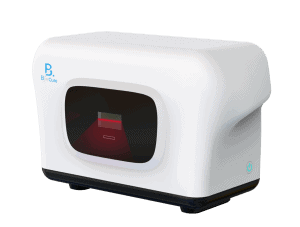
Fastgene is a PCR-on-chip research project initiated at the beginning of Elveflow’s story. Taking advantage of microfluidics efficiency, this technology came out after almost a decade of research and development.
It allows an ultra-rapid detection of pathogens (e.g., Ebola and the SARS-CoV-2 virus of the Covid-19 crisis).
In 2010-2011, Elvesys’ founders worked on a disruptive project. What if temperature could be controlled at the second scale to allow unprecedented biological applications?
From this simple question, two main applications arose. On the one hand, a team led by Jeremy Cramer focused on controlling temperature to precisely control cell mechanisms (cell division, chromosome segregation, protein stability…). Cherry Biotech was founded in 2014.
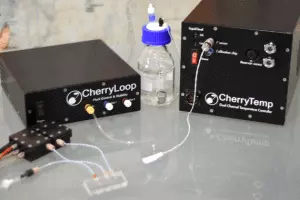
Fast PCR-on-chip for pathogens detection
On the other hand, temperature ramps are the limiting factor in the gold standard PCR technique. Did you say PCR? Polymerase Chain Reaction is a gold standard used in laboratories to amplify DNA. With many genetic applications (cloning, detection, mutation…, etc.), PCR is a sequence of steps where an original DNA sequence is processed to allow for rapid duplication and amplification until a sufficient quantity of nucleic acid material is obtained.
If we simplify, a typical PCR cycle follows three steps:
- Denaturation of the original double-stranded DNA sequence. Typically, it is around 95°C for 20-30 seconds.
- Annealing of specific primer DNA short sequences to the single-stranded DNA matrix. From 50 to 65°C, depending on the primers, for approx. 30 seconds.
- Extension of the newly synthesized complementary DNA strand. Temperature of 72°C for some minutes, depending on the length of the DNA strand to be copied.
Steps 1 to 3 are repeated 25-30 times, allowing for an exponential amplification of the original DNA sequence. As each cycle doubles the DNA quantity, one may end up with 2^30 copies after 30 cycles!
Consequently, the limiting factor to speed up the entire process is the ability to get rapid thermal cycles. From there, started the “Fastgene” research pro project. This original temperature question is about the efficiency of low volume-to-surface ratios.
A liquid whose temperature is tightly controlled can be actuated into a specific chamber, allowing for a precise and very efficient control of temperature. Controlling and changing the temperature at the micro-scale is easy and ultra-rapid, as shown in an original Fastgen quantitative PCR characterization characterization.
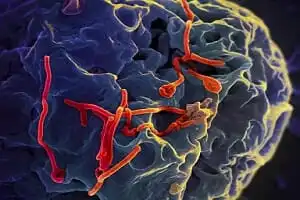
Mael Leberre founded BforCure in 2018 after a long period of research and development. The original technology has been improved and is now a robust system to detect short nucleic acid sequences in an unprecedented short time.
As a strong proof-of-concept, the Fastgene platform detected Ebola and Anthrax variants in less than 10 minutes! (see LOC publication).
Today, we are very proud of this story as BforCure was selected by the French Ministry of Armed Forces with a 1.8 million Euro grant to develop a rapid point-of-care method to detect COVID-19 in less than 30 minutes!
The project is called NOMORECOV and will strongly contribute to boosting BforCure’s objective: “For future outbreaks, including the possible seasonal reoccurrence of SARS-CoV-2, people will be able to be tested and have results within minutes at multiple sites, such as airports, hospitals, outside of office buildings, etc.”
Check out the press releases:
We have a single word to say to the BforCure team: BRAVO!
PCR-on-chip for bacteria and viruses diagnosis in only 7 minutes
Aim of the project
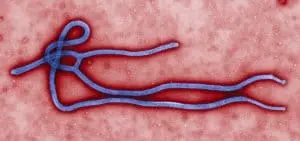
Detect Ebola in 8 minutes? Anthrax in 7 minutes? It is possible with PCR-on-chip.
The Fastgene project aims to exploit the unique features of microfluidics to provide the world’s fastest qPCR system for medical diagnosis. Indeed, Fastgene can detect the presence of pathogens such as Bacillus anthracis (Anthrax agent) and the Ebola virus in less than 8 minutes (which means seven times faster than conventional off-the-shelf apparatus).
More importantly, this outstanding reduction in the assay duration does not affect qPCR amplification volume, efficiency, or sensitivity, which are on par with conventional apparatus.
Why is it so important to be fast and specific?
The 2014 Ebola outbreaks demonstrated that currently available diagnostic tools are not up to tackle effectively widespread epidemics.
Indeed, current devices are:
- Either fast but lacking sensitivity, meaning they don’t allow early diagnosis.
- Or sensitive but time-consuming, meaning they need several hours to produce a result that the doctor can process.
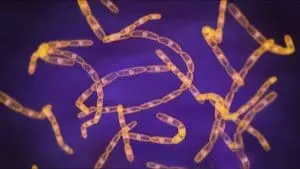
History of the Fastgene PCR-on-chip
Elveflow is committed to this goal: develop the fastest specific diagnostic tool.

The Fastgene system allows ultra-fast assays typical of research-oriented setups while retaining the same performance of off-the-bench approaches regarding sensitivity and specificity. Such performances are made possible thanks to the most sensitive and reliable diagnostic method: the real-time Polymerase Chain reaction (qPCR).
From a PhD thesis to the most innovative system of 2014
Elvesys is a French startup in microfluidics founded in 2011. Since then, Elvesys has created a new startup every year. In 2012, it obtained funding from the DGA for Fastgene, managed in partnership with the ENS. In 2014, Elvesys was awarded the “Innovation 2030 Worldwide Challenge” thanks to Fastgene.
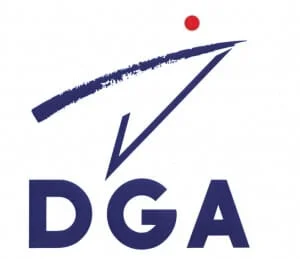

Fastgene PCR-on-chip system and its performances
PCR on chip: Fastgene’s powerful weapons against diseases.
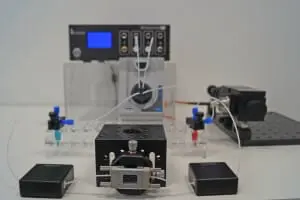
The Fastgene diagnostic system is based on the quantitative polymerase chain reaction (qPCR), a molecular test that detects bacterial and virus DNA.
Fastgene technology uses a patented microfluidic thermalization technique with microfluidic chips and Elveflow high-performance pressure controllers.
Outstanding thermalization performances enables ultra-fast detection.
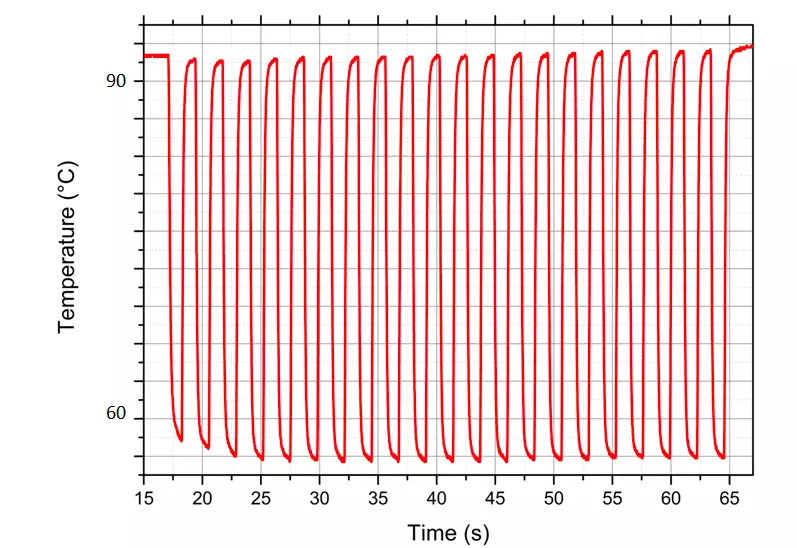
Microfluidics thermalization is the basis of Fastgene, enabling it to be the fastest microfluidic-based diagnostic tool to our knowledge.
Indeed, the Fastgene system has been tested on Anthrax and Ebola-simulating agents in 7 minutes, making it 7-14 times faster than current systems.
Furthermore, the Fastgene detection limit is on par with off-the-shelf methods.

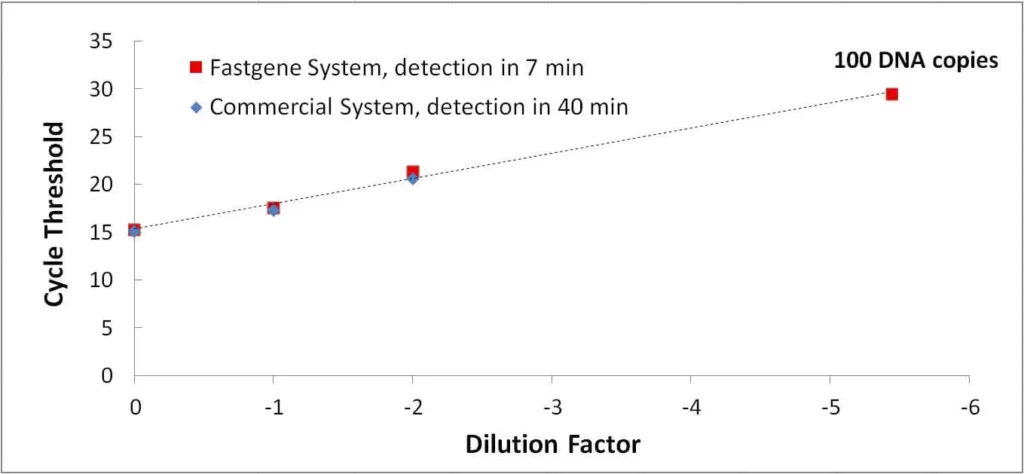
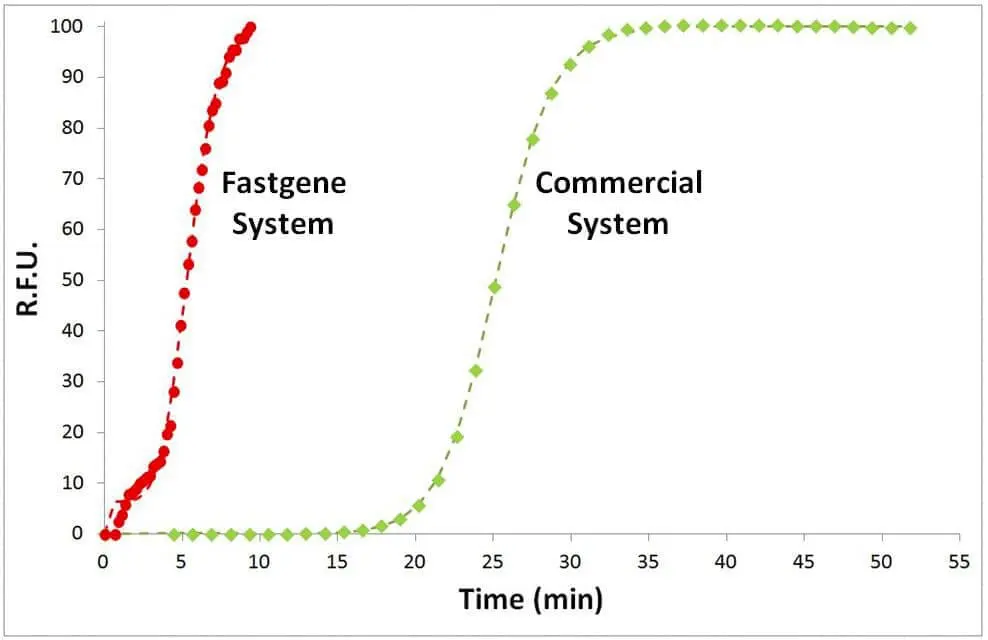
The people behind the study
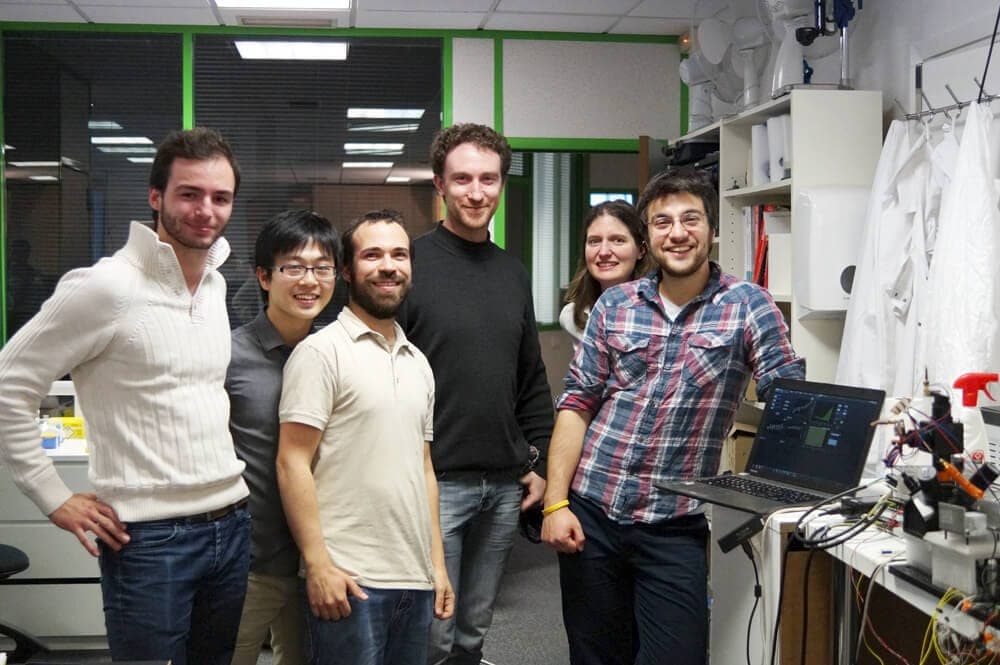

DR. MAËL LE BERRE
ELVESYS CTO
Phd in Microfluidics
Manager of the Project

WALTER MINNELLA
MARIE CURIE PHD FELLOW
Msc in Applied Physics
Responsible of thermics and fluidics

MATHILDE DUPARD
R&D ELECTRONICHS ENGINEER
Msc in Electrotechnics
Responsible of Electronics

DR. PIERRE-EMMANUEL DOUARRE
R&D MOLECULAR BIOLOGY ENGINEER
PhD in Microbiology
Responsible of molecular biology

DR. AHN DUC VU
R&D OPTICS ENGINEER
PhD in Physics
Responsible of optics

MORGAN CAZAUD
INTERN
Msc in Electrotechnics
Mechanical conception
References
1. Houssin, T., Cramer, J., Grojsman, R., Bellahsene, L., Colas, G., Moulet, H., Minnella, W, Pannetier, C., Leberre, M., Plecis Chen, Y. (2016). Ultrafast, sensitive and large-volume on-chip real-time PCR for the molecular diagnosis of bacterial and viral infections. Lab Chip. doi:10.1039/C5LC01459J
2. D. Lee, P.-J. Chen and G.-B. Lee, Biosens. Bioelectron., 2010, 25, 1820–1824.
3. S. Kirchner, K. M. Krämer, M. Schulze, D. Pauly, D. Jacob, F. Gessler, A. Nitsche, B. G. Dorner and M. B. Dorner, Appl. Environ. Microbiol., 2010, 76, 4387–4395.
Elveflow has been awarded several times and covered in many national media outlets for its Fastgene technology.
Fastgene project presented for the TV show “Des inventions et des hommes” (“Inventions and Men”) on M6 channel.


Corresponding press article in l’Entreprise here
Ultra fast temperature control PCR-on-chip for biology
Other press articles about the FASTGENE project
Press article about Fastgen in 20 minutes: “It is one of Hollywood film’s favorite subjects. If movies like Outbreak, The Flu, or Contagion show with or less realism the consequences of a pandemic on civil society, in real life, ELVESYS developed a technology enabling the detection of any virus or bacteria three times faster than any regular methods by using microfluidics.”
Press article in la Tribune about Fastgene here with an interview of ELVESYS President Guilhem Velve-Casquillas. This latter explains: “[The Fastgene project] is based on my thesis and is very important for me. It will detect any virus, bacteria, or tumors in less than 10 minutes, at lower costs, without going to the hospital.”
Press article in l’Usine Nouvelle about Fastgene PCR on chip here: “[ELVESYS] also develops with the Defense ministry a technology enabling a lab-on-chip to detect a virus or a bacteria in 10 minutes.”
Press article in Silex ID about Fastgene, dec. 2014, here: “[The Fastgene project] consists in a miniaturized chip able to “scan” the human organism in less than 10 minutes, from a single drop of blood or saliva. This microfluidic technology, adaptable to any lab-on-a-chip and enabling rapid detection of bacteria or even circulating tumor cells, is a potent prevention tool, notably in the case of bacteriological attack. The French army is, moreover, an ELVESYS’ purchaser”.
Check our Projects
FAQ – Nanoparticle delivery across blood-brain barrier - NAP4DIVE
1) Simple definition of Fastgene?
Fastgene is a microfluidic PCR-on-chip system that enables real-time detection of pathogens to be reduced to a matter of minutes rather than hours and enables the rapid detection of viruses and bacteria, including Ebola or Bacillus anthracis, through small amounts of sample.
2) What was the reason Fastgene was invented?
The initial issue was misleadingly straightforward: what would happen to be able to regulate the temperature at the second scale in microchannels? Based on that concept, the group discovered that microfluidics, with its very large surface to volume ratios, could heat and cool PCR mixtures much quicker than other tools. It was the basis of Fastgene: a system designed to eliminate the thermal-cycling bottleneck in PCR, and to make molecular diagnostics really high-speed.
3) The real mechanism of microfluidic PCR-on-chip at Fastgene?
Fastgene does not have to cycle a complete metal block or large well plate, but it forces a little liquid plug through microfluidic chambers, the temperature of which is kept at a very constant level. The system can use 30 PCR cycles in approximately 2 minutes on chip using ultra-efficiency thermalization. It has an inbuilt real-time qPCR readout (fluorescence) and thus you do not just get amplification you get a direct indication of when the target pathogen is present and at what level.
4) What is the rate of it relative to traditional PCR systems?
The Fastgene system has been shown to identify pathogens in 7-8 minutes and has been validated in Ebola and Anthrax surrogates and is roughly 7-14 times faster than conventional off-the-shelf qPCR tools. Notably, it is this dramatic time gain that comes without the cost in terms of sensitivity or amplification efficiency: detection limits and amplification curves are comparable to the state of the art commercial systems.
5) Does acceleration undermine performance of the assay (sensitivity, efficiency)?
No. Direct comparisons indicate that Fastgene matches high-end benchtop qPCR systems in terms of molecular detection efficiency and limit of detection, but is even faster than them in most applications, by up to 6 times. The actual technical success of the project is that balance: ultrafast cycling and the quality of qPCR was normal.
6) What are the types of pathogens that Fastgene is able to identify?
The platform is aimed at capturing short sequences of nucleic acids of both bacteria and virus. In proof of concept Fastgene has been able to identify Ebola and Anthrax variants in under 10 minutes, and it is agnostic in that any pathogen that you can design a qPCR assay (primers/probes) can theoretically be adapted to the chip. This makes it appealing to epidemic preparedness, biodefence, on the one hand, but to more mundane infectious-disease diagnostics, on the other.
7) What were the steps this technology followed to achieve valorization success story?
Fastgene was originally a research project in the very beginning of the history of Elveflow and MIC and developed almost ten years. The microfluidic thermalization system underneath was patented circa 2010, and funded in 2012 by the French Ministry of Defence (DGA), and later developed together with ENS Paris. In 2014, the technology was the winner of the “Innovation 2030 Worldwide Challenge” and this was an indication that the technology has ceased being an academic whim to be considered as an innovation. To industrialize the platform in order to make prompt molecular diagnostics BforCure was a separate company established in 2018.
8) What was the role of Fastgene during the situation with COVID-19 and response to epidemics?
One of the strongest candidates to use in pandemic was the capability of Fastgene to detect nucleic acids within several minutes. BforCure, the successor of Fastgene, was chosen by the French Ministry of Armed Forces under the NOMORECOV project with a 1800000 euro grant targeted at point-of-care COVID-19 tests within under 30 minutes in areas such as airports, hospitals or office doors. The bigger picture is evident: the future outbreak should have the same speed and ubiquity of a temperature check.
9) How is the performance of Fastgene particularly microfluidic?
Microfluidic thermalization is the main key. The system is able to produce very fast and uniform temperature change by confining the PCR mix into micro-scale geometries and driving it at high-performance pressure controllers. This is the reason why Fastgene is capable of doing 30 cycles within a few minutes and maintaining amplification curves clean. Microfluidics also decreases the usage of reagents and allows the use of compact and rugged instruments which can be deployed in the field and not just central laboratories.
10) What are the project personnel and organizations?
Fastgene is based on Elvesys/MIC ecosystem. The central group is composed of microfluidics and thermics and fluidics specialists, electronics engineers, molecular biologists and optics engineers, such as Mael Le Berre (later founder of BforCure) and Walter Minnella in electronics and optics. At the institutional level, the DGA has helped the project, has been a partner at ENS Paris, and the project has been featured extensively in French media and innovation awards.
11) What can the European consortia or industrial partners do with Fastgene now?
Today, Fastgene is a developed ultrafast qPCR-on-chip system that demonstrates its performance in regard to high-risk pathogens. A national project or a Horizon Europe project can:
-customize the system to new panels ( respiratory sepsis antimicrobial-resistance genes),
-implement it into epidemic surveillance networks that are decentralized,
-or integrate it into mobile, battery driven platforms of field diagnostics.
MIC is capable of doing microfluidic design, thermalization engineering, system integration and prototype delivery, and partners come with clinical samples, epidemiology and regulatory pathways. Practice in numerous European calls indicates that the consortia with MIC are more likely to increase by perhaps two times their success in making proposals compared to official Horizon averages, in large part because reviewers believe in the synergy of effective engineering and moderate valorisation strategies.
12) Is Fastgene a high-stakes epidemics-only company, or can it apply to ordinary diagnostics as well?
It is both. Its initial impetus was the crises such as the 2014 Ebola outbreak when the lack of fast diagnostics made the problem of containment almost unfeasible. However, when you have a platform capable of performing high quality qPCR in a few minutes then the same device becomes appealing to routine infectious disease diagnostics and hospital workflows, and even occupational health screening. That is, the ultrastiff microfluidic backbone used by epidemic preparedness and daily medicine may be identical.